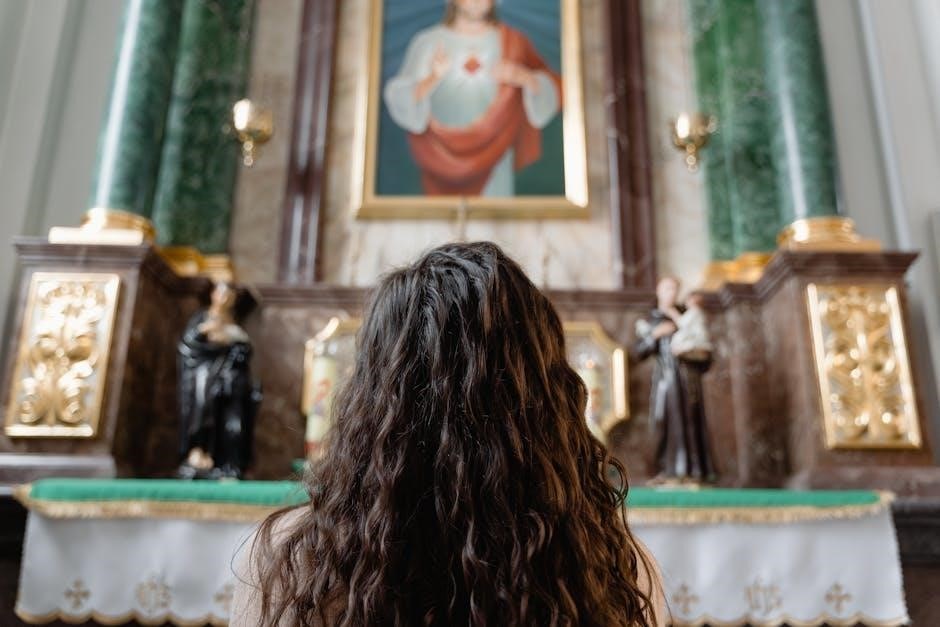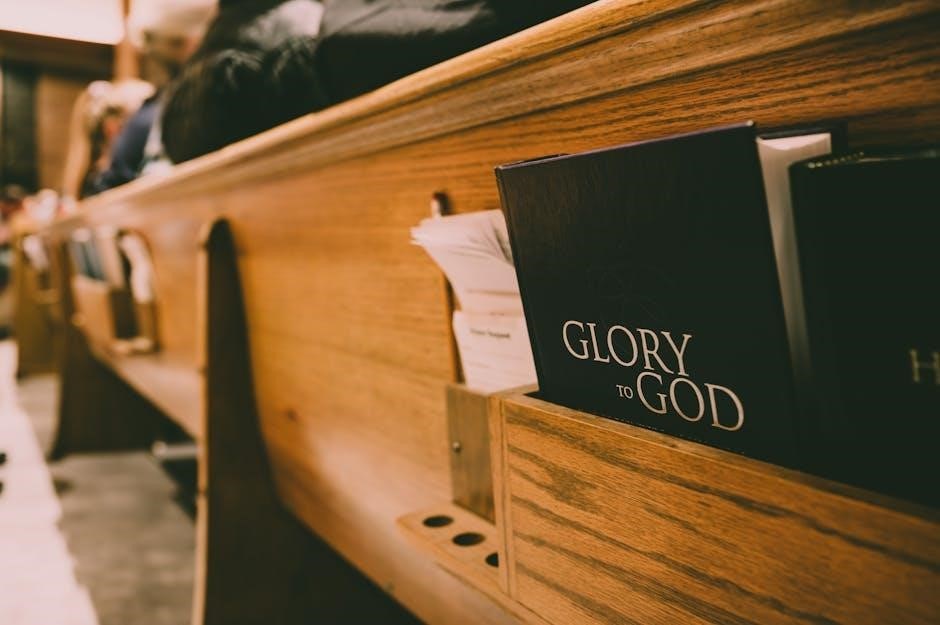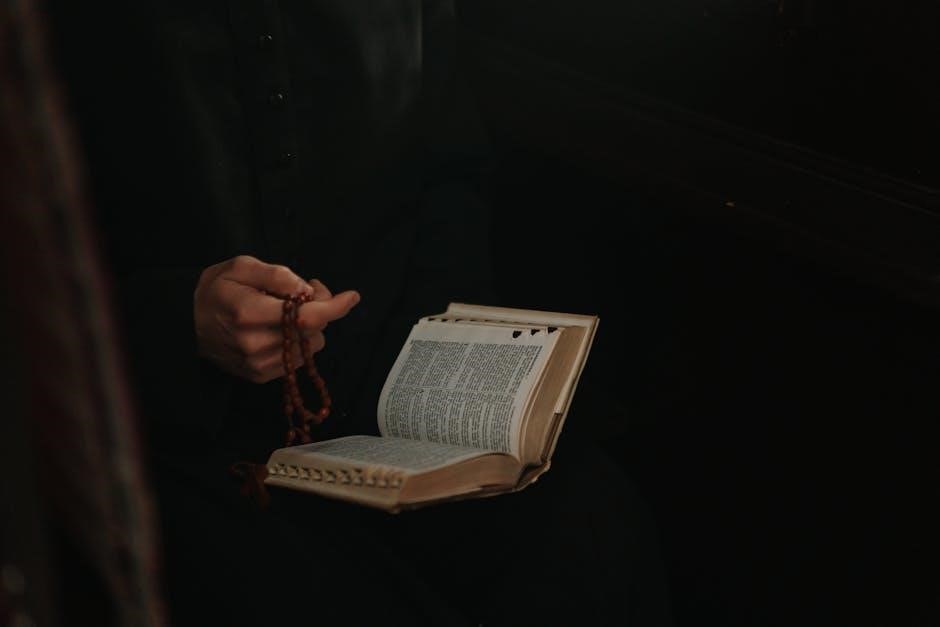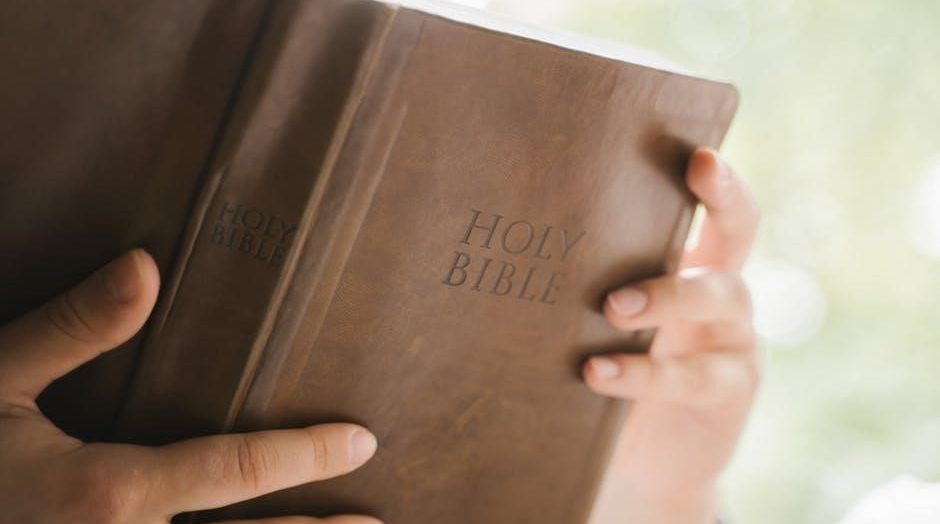Freemasonry, a fraternal organization, deeply intertwines biblical teachings with its philosophical framework, using the Bible as a moral guide in rituals and ceremonies, fostering unity and enlightenment among its members.
Overview of Freemasonry and Its Connection to the Bible
Freemasonry, a fraternal organization, deeply integrates biblical teachings into its philosophy, using the Bible as a cornerstone of moral and ethical guidance. The Bible is often central to Masonic rituals, symbolizing divine truth and wisdom. Freemasonry does not replace religion but complements it, encouraging members to follow their faith while fostering universal values like brotherhood, justice, and compassion. The connection between Freemasonry and the Bible is evident in its use of biblical texts in ceremonies and its emphasis on shared moral principles. This relationship reflects Freemasonry’s commitment to spiritual growth and its recognition of the Bible’s enduring influence on human values and society.

Historical Origins of the Bible in Freemasonry
The Bible’s use in Freemasonry traces back to early rituals, with the first Masonic Bible reference in Anderson’s 1723 Constitutions, integrating biblical teachings into Masonic traditions historically.
Early Use of the Bible in Masonic Rituals
The Bible’s integration into Freemasonry began in the early 18th century, with the first recorded reference in Anderson’s 1723 Constitutions. It was used as a moral guide, emphasizing truth and righteousness; The Bible was placed alongside other sacred texts in Masonic lodges, symbolizing its importance. Early rituals incorporated biblical verses to convey ethical lessons, with initiation ceremonies often referencing biblical narratives. This practice reinforced Freemasonry’s commitment to universal moral principles. The Bible’s presence in rituals served to unite members across diverse backgrounds, fostering a shared understanding of moral values. Its early use laid the foundation for its enduring role in Masonic teachings and ceremonies, solidifying its significance within the fraternity’s traditions.

Symbolic Connections Between Freemasonry and the Bible
Freemasonry and the Bible share rich symbolic ties, with biblical narratives and themes woven into Masonic rituals, emphasizing moral truths, spiritual growth, and divine wisdom, uniting members in shared values.
Biblical Themes in Masonic Teachings
Biblical themes are deeply integrated into Masonic teachings, emphasizing moral and ethical values such as justice, compassion, and truth. Freemasonry draws parallels between its rituals and biblical narratives, using parables like the building of Solomon’s Temple to symbolize personal and communal growth. The concept of divine wisdom, central to both traditions, encourages self-reflection and service to others. Masonic teachings also highlight the universal principles of brotherly love and equality, reflecting biblical injunctions to care for humanity. By incorporating these themes, Freemasonry creates a framework for spiritual enrichment, blending religious symbolism with philosophical inquiry to guide members toward a harmonious and enlightened life.

The Role of the Bible in Masonic Rituals
The Bible serves as a central symbol in Masonic rituals, representing divine truth and moral guidance, and is often displayed prominently during ceremonies to inspire reflection and unity.
Incorporation of Biblical Texts in Ceremonies
The Bible is integral to Masonic ceremonies, with specific texts often read to convey moral lessons. For instance, passages from Psalms and Proverbs are frequently used to emphasize wisdom and righteousness. During rituals, the Bible is typically placed alongside other sacred texts, symbolizing its revered status. Masonic ceremonies incorporate biblical narratives to illustrate ethical principles, such as the importance of truth, justice, and compassion. The use of biblical texts serves to unify members across diverse backgrounds, reinforcing shared values. This practice highlights Freemasonry’s commitment to spiritual growth and its belief in the timeless relevance of sacred scripture. The inclusion of the Bible in ceremonies underscores its role as a moral anchor within the fraternity.

Religious Perspectives on Freemasonry’s Use of the Bible
Some Christian denominations criticize Freemasonry’s use of the Bible, viewing it as misinterpreted or used out of context, while others see its symbolic role as unifying and morally enriching.
Views from Various Christian Denominations
Christian denominations hold diverse views on Freemasonry’s use of the Bible. The Catholic Church has historically opposed Freemasonry, viewing it as incompatible with Christian teachings due to its perceived syncretism and secretive nature. Some Protestant denominations, however, are more tolerant, acknowledging Freemasonry’s moral framework while cautioning against its ritualistic practices. Evangelical groups often critique Freemasonry for interpreting the Bible outside traditional Christian contexts, while others see its emphasis on brotherly love and charity as aligned with biblical values. These differing perspectives reflect broader theological debates about Freemasonry’s role in religious life and its interpretation of sacred texts like the Bible.

Freemasonry’s Influence on Biblical Interpretation
Freemasonry has historically influenced biblical interpretation through its allegorical and symbolic approach to scripture. By integrating biblical narratives into its rituals and teachings, Freemasonry encourages a universal understanding of moral and ethical principles. This unique perspective often blends biblical themes with philosophical ideas, fostering a deeper exploration of spiritual truths. While some interpret this as enriching biblical study, others argue it diverts from traditional theological frameworks. Freemasonry’s emphasis on symbolism and metaphor has shaped how many members engage with the Bible, promoting a more personal and reflective approach to its teachings.
Masonic Philosophy and Biblical Teachings
Masonic philosophy and biblical teachings share common ground in promoting moral values, brotherly love, and self-improvement. Freemasonry draws heavily from biblical narratives, using them as allegorical tools to convey ethical lessons. While the Bible is revered as a sacred text in Masonic rituals, Freemasonry’s interpretation often emphasizes universal truths over sectarian doctrines. This inclusive approach allows members of various faiths to find commonality in its teachings. However, some Christian denominations critique Freemasonry for what they see as a deviation from traditional biblical interpretation. Despite this, the interplay between Masonic philosophy and biblical themes continues to inspire introspection and spiritual growth among its members, fostering a unique blend of faith and fraternal ideals.

Digital Resources: The Freemasonry Bible PDF
The Freemasonry Bible PDF offers insights into Masonic rituals, symbols, and biblical connections, providing a comprehensive digital resource for understanding Freemasonry’s rich history and philosophies online.
Availability and Content of Masonic PDFs
Masonic PDFs, including the Freemasonry Bible, are widely available online, offering detailed insights into rituals, symbols, and historical connections. These digital resources provide comprehensive guides for both seasoned Masons and newcomers, exploring philosophical teachings and biblical interpretations. Many PDFs include ceremonies, symbolic meanings, and historical texts, serving as invaluable tools for understanding Freemasonry’s principles. Some documents are translated into multiple languages, ensuring global accessibility. They often feature commentary on Masonic philosophy, making them rich resources for research and personal enlightenment. These PDFs are easily accessible through various Masonic websites, libraries, and online archives, catering to diverse interests and educational needs within the Masonic community and beyond.
Addressing Conspiracy Theories
Conspiracy theories often falsely link Freemasonry and the Bible, portraying them as secretive or sinister. These claims are debunked by historical records and Masonic teachings emphasizing moral values and transparency.
Common Misconceptions About Freemasonry and the Bible
Freemasonry is often misunderstood, with theories suggesting it contradicts biblical teachings or promotes secrecy. However, Freemasonry does not oppose Christianity; it embraces moral values shared across religions. The Bible, while central to many Masonic rituals, is not the sole text used, as other sacred writings are also respected. Misconceptions arise from its symbolic nature and historical secrecy, leading to unfounded claims of a hidden agenda. In reality, Freemasonry focuses on personal growth, brotherhood, and community service, aligning with biblical principles of love, justice, and compassion. These misunderstandings highlight the need for accurate dialogue and education about Freemasonry’s true purposes and values.
